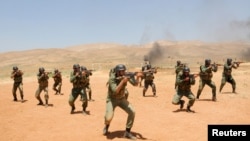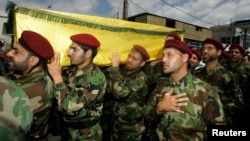Government warplanes carried out several bombing raids on Qusair throughout Wednesday and Hezbollah rushed in reinforcements in an attempt to dislodge the rebels from Qusair, a strategic city on the main highway into central Lebanon, through the Bekaa Valley and on to Beirut.
Members of Hezbollah have become key battleground allies of Syrian President Bashar al-Assad. Both follow the Shiite sect of Islam and both are closely allied with Shiite Iran. Most of the rebels are Sunnis.
Clashes between Hezbollah and rebel forces led by Al Qaeda-linked fighters belonging to the Jabhat al-Nusra raged in many districts of Qusair. The bloodiest battles were centered in the northern districts of the city, where Hezbollah militiamen have been unable to dislodge Syrian rebels. Anti-government activists said the rebels had made headway in pushing back Hezbollah on the west side of the city.
Hezbollah spokesman Ibrahim Moussawi conceded that the north of Qusair was proving the hardest to subdue. “It is very hard and difficult to take. There are snipers everywhere. This will cost us but we'll take it,” Moussawi said.
Reports of chemical attacks
The see-saw battle over Qusair came as claims mounted of Syrian government forces using chemical weapons in the outskirts of Damascus, this time in the suburb of Jobar about two kilometers northeast of the old city walls. Reporters from the French newspaper Le Monde witnessed the after-effects of what they and rebels with the Tahrir al-Sham ('Liberation of Syria') brigade believe were gas attacks launched by government troops over several days this week.
“We thought it was a mortar that didn't explode, and no one really paid attention to it,” Omar Haidar, the brigade’s chief of operations, told the newspaper. “No odor, no smoke, not even a whistle to indicate the release of a toxic gas. And then the symptoms appear. The men cough violently. Their eyes burn, their pupils shrink, their vision blurs. Soon they experience difficulty breathing.”
The Assad government has denied using any chemical weapons. A few weeks ago, the government traded accusations over reports of the use of a chemical weapon in the northwest of the city of Aleppo that killed more than 20 people and wounded another 80, with each side blaming the other for the attack.
In December, U.S. President Barack Obama warned that any use of chemical weapons would be “totally unacceptable” and a “red line” that could trigger Western intervention.
US red line on chemical weapons
The Obama administration told Congress last month that U.S. intelligence agencies had assessed “with varying degrees of confidence” that Syria has used small amounts of chemical weapons in the conflict. But the U.S. president said he needed more conclusive evidence.
The British Foreign Office released a statement Wednesday saying, “The U.K. is extremely concerned about the ongoing allegations of chemical weapons use in Syria.” British officials confirmed they have provided more information to a United Nations inquiry team that the Assad government has prevented from entering Syria to investigate on the ground.
French Foreign Minister Laurent Fabius reacted to the Le Monde report even more sharply. In a radio interview, Fabius warned of a “severe reaction” if chemical weapons had been used by Syrian government forces. Asked what “severe” meant, Fabius said: “It’s the final stage before a strike.”
Tests on samples brought from Syria by French reporters will take nearly a month to analyze, according to French Foreign Ministry spokesman Philippe Lalliot.
The ferocity of the fighting in Qusair reflected the strategic significance of the city. Analysts believe Qusair would be crucial for Assad if he and his allies were forced to try to form an enclave near the coast north and east of Lebanon.
But Syrian rebel sources and their overseas supporters say the timing of the attacks on Qusair may have more to do with the Assad government maneuvering ahead of proposed peace talks next month that have been endorsed by both the U.S. and Russia.
Maneuvering for peace talks
“He’s determined to grab back as much lost ground as he can,” says Brian Sayers of the Syrian Support Group, a U.S.-based group that supports the rebellion and advocates for a democratic Syria.
The fight involving artillery bombardments and air strikes has for the first time brought Hezbollah in large-scale confrontation with Sunni Muslim fighters from the al-Nusra front, many of whose fighters have come from other Middle Eastern and Central Asian countries.
Rebel sources told VOA that al-Nusra fighters are taking the lead for the rebels on many fronts in Syria. Likewise, they claim that there are few Syrian government forces now in the fight. “We are fighting Hezbollah,” one of the sources said in a Skype call.
A military analyst at the U.S. Department of Defense told VOA that Hezbollah leaders may have been surprised by the stiff resistance they have faced.
“I think only now are they appreciating what effective and experienced fighters they are facing,” the U.S. analyst said. “Many of the Hezbollah fighters have been trained for defensive actions against Israel and are not so used to offensive tactics.”
Trained in defense or not, Hezbollah is sending in more fighters into Qusair and further afield, according to Syrian opposition sources. Khaled Saleh, a spokesman for the Syrian National Coalition, said Hezbollah operations are now stretching to the outskirts of Damascus.
“Something very dangerous is happening: the Hezbollah militia has begun to move into the outskirts of Damascus. This is a new development that we did not expect,” Saleh said.





